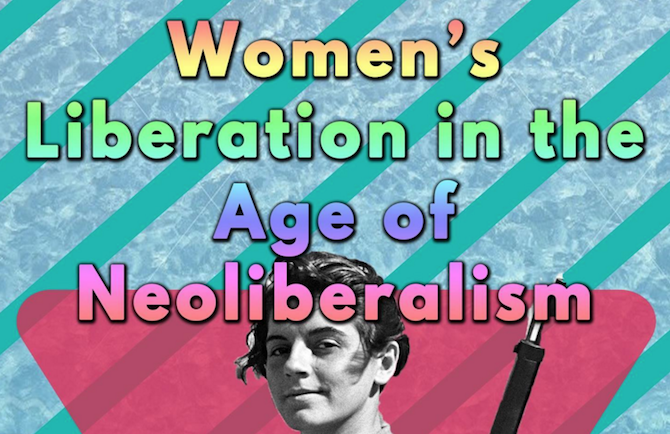
Dr. Kennedy began that by stating that feminism means “very different things” to different people, and that there are various feminist movements. She outlined that her discussion would centre around mainstream, hegemonic feminism, as opposed to Marxist feminism or similar doctrines. More specifically, the speech explored the relationship between the ideology of personal responsibility associated with neoliberalism, capitalism and modern feminism. Kennedy said that since the second wave of feminism, the movement has evolved into something other than that which “challenges the system”, and has developed into an “unhealthy relationship with capitalism”.
A video advertisement campaign by the Irish Independent, featuring the tag-line “we are defined by the choices we make”, was used to illustrate this context. The campaign used issues that illicit polarising responses such as austerity, emigration, abortion and sexuality to illustrate a duality of choice. For example, an image of a pro-life badge is shown side by side with an image of a pro-life badge. She explained that much like the campaign, neoliberalism and capitalism suggests strong personal responsibility for our individual actions and choices and “ignores wider social constraints which” affect a person’s outcomes in life.
Drawing from the work of the academic Wendy Browne, she argued that neoliberalism reduces feminism to suggestions that women “empower themselves” and “stand up for themselves” and that the responsibility to confront some sexist co-worker lies on them. This scenario disregards the woman’s job security and other factors, as neoliberalism is prone to ignore factors other than personal responsibility.
She explored the topic of neoliberalism in relation to class and feminism, highlighting that neoliberalism exacerbates class divide and feminist issues. In the words of Guardian writer Eleanor Robertson: “Liberal feminism’s theoretical poverty and ignorance of structural factors explain the gap between its omnipresence in public discourse and seeming lack of ability to achieve material gains for women.”
In her paper “Marxism and Feminism in the Age of Neoliberalism”, Kennedy also criticises the work of feminist Sheryl Sandberg, CEO of Facebook, on the grounds of its overstatement of personal responsibility and the ‘trickle-down’ effect. Capitalism, she argues, is not separate from issues pertaining to women as some may argue: “mainstream feminists will always seek to limit the scope of the struggle and keep it within bounds that are acceptable to their class interests.”
By allowing the neoliberal ideas of “ self-empowerment” to dominate her conception of feminism, Sandberg fails to recognise that: “The reason that some women in our society have been able to rise in the corporate and political world was not the result of power trickling down; rather it was a direct result of the women’s movement of the 1970s and 1980s that mobilised men and women to fight for equality.”
Replying to a question from the floor from a Trinity bioengineering lecturer Sonja Hermann, Dr.Kennedy discussed the issue of women’s lack of confidence or authority in industry and academia in general. Hermann argued that female students aren’t taught that “there’s a place to be nice and and a place to be affirmative”. Kennedy observed that such a topic was focused on the middle and upper classes, saying that: “there is a difference between hitting your head off the glass ceiling and falling into the gutter- and at the moment more women are falling into the gutter.”






